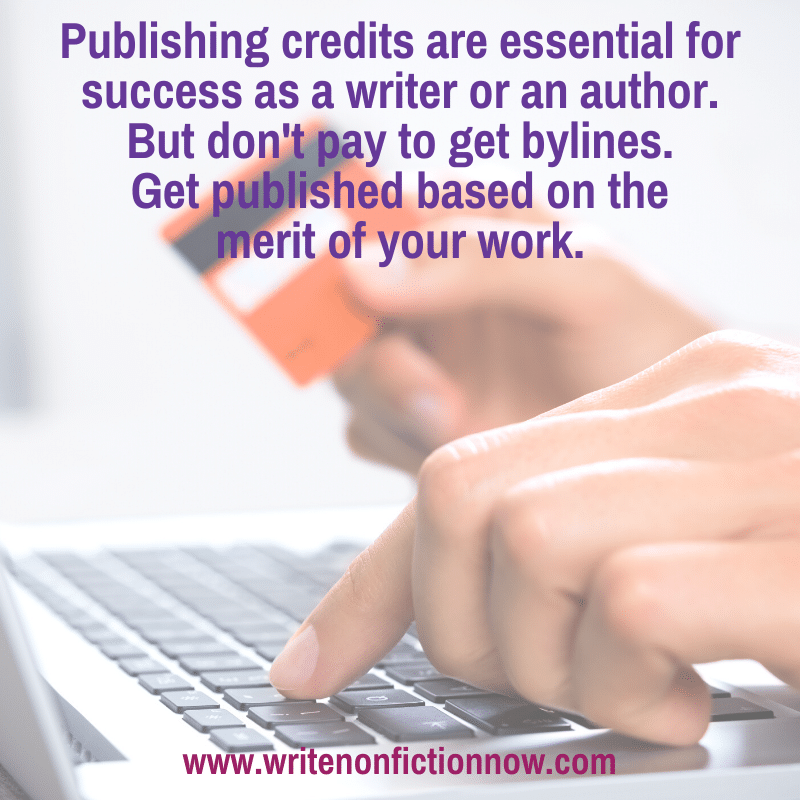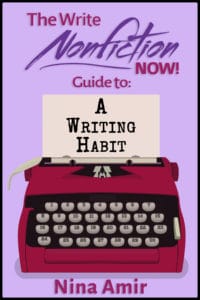 You notice the call for submissions. An influencer or expert is compiling an anthology, or someone well known is creating a compendium of stories on a specific subject. You can submit your writing and, if accepted, pay for inclusion in the book.
You notice the call for submissions. An influencer or expert is compiling an anthology, or someone well known is creating a compendium of stories on a specific subject. You can submit your writing and, if accepted, pay for inclusion in the book.
If you throw your name in the hat, your chapter might be accepted and included in the published book. As a result, you could ride on someone else’s already successful coattails, thus increasing your chances of being part of a bestselling book.
Should you submit?
Don’t Pay for Authorship
Opportunities to have your work included in an anthology abound and look enticing. Therefore, it’s no wonder that aspiring authors often ask me if they should take advantage of these chances to get published.
Typically, my answer is no.
As with any opportunity, there are pros and cons to consider. Despite the benefits, I still lean toward becoming an author in other ways—even for unpublished writers.
Let me explain why.
You Aren’t THE Author
I have heard many friends and colleagues brag about the fact that they are authors. However, when I ask for book details, I discover that they wrote a chapter published in an anthology.
If you’ve done the same, this qualifies you as a published writer. It’s a publishing credit or byline. However, it’s no reason to claim you have authored a book.
Why? You have only written a chapter in a book. Your work was included in an anthology.
For instance, if you look at the Chicken Soup for the Soul series, only the editor’s name is on the cover. This person is the one who compiled the anthology. The other writers—all of whom had work accepted for inclusion in the book—are mentioned in correspondence to their specific chapter.
The same is true of Jack Canfield’s Road to Success series. Only Canfield and any other “big name” writers are on the cover. The other contributors are mentioned with their chapter titles.
I’ve done Amazon.com searches for a so-called author and not found them…anywhere on the site. I searched by their name, the book title, and then again with their name and the book’s title. I found nothing.
If you want to be an author, getting published is essential. Inclusion of your work in an anthology is one way to get a publishing credit. And, while it does establish you as a published writer, it does not make you the author of a book.
You Pay to be Published
As a magazine journalist student, I was taught by every single professor that I must get paid for my work. Free internships and a few unpaid articles were acceptable to get started. After that, though, I was not to write a word without knowing I would get paid.
It’s no wonder that paying for publication goes against my grain. Dishing out money to get a byline contradicts everything I learned and now teach related to becoming a published author.
Most opportunities to be included in an anthology featuring an influencer, expert, or celebrity require payment. You might pay a small fee—$300—or a large one—$3,000.
You’ll pay more to have your picture…or name…on the book cover with the well-known person. And the fee does not include a version on Amazon that features you. If it did, I’d be able to find books on that site written by the people I know paid to be published in a compendium.
 Let’s look at an example that does not include pay for publication. Search on Amazon for a writer included in my Write Nonfiction NOW! series of ebooks. For example, search for Carol Tice or Tom Corson-Knowles. You will find all their books…and my ebook, The Write Nonfiction NOW! Guide to a Writing Habit. Each of these writers contributed a chapter.
Let’s look at an example that does not include pay for publication. Search on Amazon for a writer included in my Write Nonfiction NOW! series of ebooks. For example, search for Carol Tice or Tom Corson-Knowles. You will find all their books…and my ebook, The Write Nonfiction NOW! Guide to a Writing Habit. Each of these writers contributed a chapter.
The writers who contribute to my ebooks do not pay to be included; I ask them to submit. While their names are not on the ebook’s cover, they are listed in the book description on Amazon—not just with their chapter title. So, even though my name is on the cover, the ebook comes up when you search by the writer’s name.
If you are going to contribute to a book, don’t you want an agent or acquisitions editor at a publishing house to find your work online? I do.
Do you want your chapter submission accepted into a book on its merits…or because you paid for that credit? Personally, I want to be published on the merits of my work.
And, to be honest, an agent or acquisitions editor is going to take that meritorious credit more seriously than a paid one every time. (They may even negate the pay-for-publication byline altogether.) That’s why it’s better to earn a byline rather than pay for one.
Your Bestseller Status is Fleeting
A lot of people tell me that they are happy to pay to be in an anthology. They want their name associated with someone well-known, and they have been promised the book will become a bestseller. Maybe you, too, find the promise of becoming a “bestselling author” too good to turn down.
Remember: you are not the author of but a contributor to an anthology. And most of these anthologies achieve only fleeting bestseller status.
Pay-for-inclusion anthologies typically do become bestsellers because the many contributors promote to their followers. In addition, the publisher may invest in promotion, especially since part of your payment goes toward marketing. Thus, book marketing is not dependent on one person.
Yet, a publisher guaranteeing that the book will be a bestseller should raise a red flag. Any publishing pro will tell you that getting a book on the Amazon bestseller list (or any list) is a crapshoot.
However, often such books do hit the Amazon bestseller list for a day…or a week. Then they disappear off the list, never to be seen again. The requirement that all the contributors help is an effective strategy…short term.
Yes, you can say your work was included in a bestselling book. But a true bestseller stays on that list for more than a day or a week. And the home run of bestseller status is the New York Times bestseller list, which these anthologies never hit.
Invest in Your Publishing Career
If you want to invest in your publishing career, write and publish your own books or articles. Get paid for submissions accepted and published in well-respected magazines. Attract a traditional publisher to your manuscript, and receive an advance on sales for your book.
Or self-publish your book. That’s an investment that will pay off long term. Your book features your name on the cover and is filled with your stories and information—only yours. It’s a real credit to your name. That’s worth paying for.
Publish a lot of articles in popular mass-media magazines. As a result, you develop a platform filled with valuable credits that will be acknowledged by literary agents and acquisitions editors alike. Sell many copies of your self-published book, and publishing pros will take notice and be happy to take on your next book project.
That sounds like a better investment than paying for inclusion in an anthology, does it not?
Have you paid to be in an anthology produced by a well-known person? Tell me about your experience in a comment below. And, please, share this post with other writers you know.
 Would you like to write and publish nonfiction work, like articles, blog posts, books, or reports…and become a successful author? Join the Nonfiction Writers’ University. Get the basic education you need and the Author Coaching to help you succeed as a nonfiction writer. Enjoy a 30-day trial membership for only $1. If you’ve felt the desire to get coached and be supported as you pursue authorship, this program is for you. Participate in monthly group Author Coaching sessions and gain access to an extensive archive of writing and publishing resources.
Would you like to write and publish nonfiction work, like articles, blog posts, books, or reports…and become a successful author? Join the Nonfiction Writers’ University. Get the basic education you need and the Author Coaching to help you succeed as a nonfiction writer. Enjoy a 30-day trial membership for only $1. If you’ve felt the desire to get coached and be supported as you pursue authorship, this program is for you. Participate in monthly group Author Coaching sessions and gain access to an extensive archive of writing and publishing resources.
Photo courtesy of rupixen .
Muz Murray says
Bravo, Nina! That needed to be said. I fully agree,
Nina Amir says
Thanks so much for your comment and support, Muz.
Maria says
Hi Nina,
Thank you for this useful article.
I respectfully disagree though. I have published my books and contributed to anthologies. Anyone who does that magnitude of work deserves the money. And a fair author shares credit and allows co-writers to have their name on the cover.
– You get publicity, invitations to podcasts, further blogs, interviews, etc. So many that I didn’t even have time for them all.
Not everyone out there is reliable, but I have a great network of writers so I benefit from the contributions that are up to 5’000 words.
So, when I don’t have tons of time to write and design, I participate in anthologies. And we form communities that support and encourage each other.
Plus, none of them have ‘stolen’ my story. I am free to write a book about the topic as long as I don’t copy-paste my prior entry. And why would I – we need to evolve.
But certainly I agree that one should only do this with authors and publishers they can trust. And there are numerous writers out there with valuable knowledge who would never publish without the support of a community and a great editor.
The authors I know did not make money off the projects. They just covered their basic expenses. Writers can buy the books with a wholesale price and sell them with a retail price. The only loss would be if, and that’s a big if, the books were suddenly huge Amazon hits.
So, let people write! Which ever form and shape they feel comfortable. Open AI will flood the market one way or another. Everyone’s voice matters.
Respectfully,
Author, Featured Columnist and Co-Writer and lots of other fun stuff
Nina Amir says
I’m glad it’s been a good experience for you.
Paul says
I have published with a website called allpoetry I submit a poem which is included in anthologies. I pay about £35 each time. I don’t expect to get money from it nor do I say it’s my book. But knowing my work is in print that people can buy us enough for me.